michael leong's poetry blog

About:

Michael Leong’s poetry career began in the sixth grade when he won his first poetry prize in Mr. Harrison’s class for a haiku about a snake. Since then, he has received degrees in English and Creative Writing from Dartmouth College, Sarah Lawrence College, and Rutgers University and was awarded a fellowship from the National Endowment for the Arts. His poems have been anthologized in The &Now Awards 2: The Best Innovative Writing (Lake Forest College Press, 2013), and Best American Experimental Writing 2018 (Wesleyan University Press, 2018). He is the author of four volumes of poetry, e.s.p. (Silenced Press, 2009), Cutting Time with a Knife (Black Square Editions, 2012), Who Unfolded My Origami Brain? (Fence Digital, 2017), and Words on Edge (Black Square Editions, 2018), as well as a translation of the Chilean poet Estela Lamat, I, the Worst of All (BlazeVOX [books], 2009). His monograph Contested Records: The Turn to Documents in Contemporary North American Poetry was published by the University of Iowa Press in 2020. He is currently Robert P. Hubbard Assistant Professor of Poetry at Kenyon College.
Contact: michael.c.leong@gmail.com
Pages
Books:

Contested Records: The Turn to Documents in Contemporary North American Poetry (University of Iowa Press, 2020).
[“Refusing the isolation of artists and individuals in favor of interrogating social realities; refusing static categorization in favor of boundary-trampling risk; refusing the rarification of poetry in favor of the embedding of its practices in the larger humanities; and highlighting difficult works and works that have caused a stir, Leong’s volume shows documental poetry to be a messy, relevant, urgent, moving art.”
—Stefania Heim, Journal of Modern Literature]
[“…one of the most comprehensive studies of documentary poetry to date…”
—Sarah Ehlers and Niki Herd, “North American Documentary Poetry and Poetics,” Oxford Research Encyclopedia of Literature]
[“Michael Leong has given us a clear-eyed, usable account of what distinguishes and connects some of the most powerful–challenging, arresting, disturbing–works of poetry published in the twenty-first century. His discussion of ‘documental’ poetry as a poetics of and for this period of information overload is persuasive and compelling, written to reward readers interested in the aesthetic and the social lives of poetry. This is the kind of scholarship we need: the journey of a mind that is curious, rigorous, and generous, unfolding invitingly, fluidly, from the first page through the last.”
—Evie Shockley]
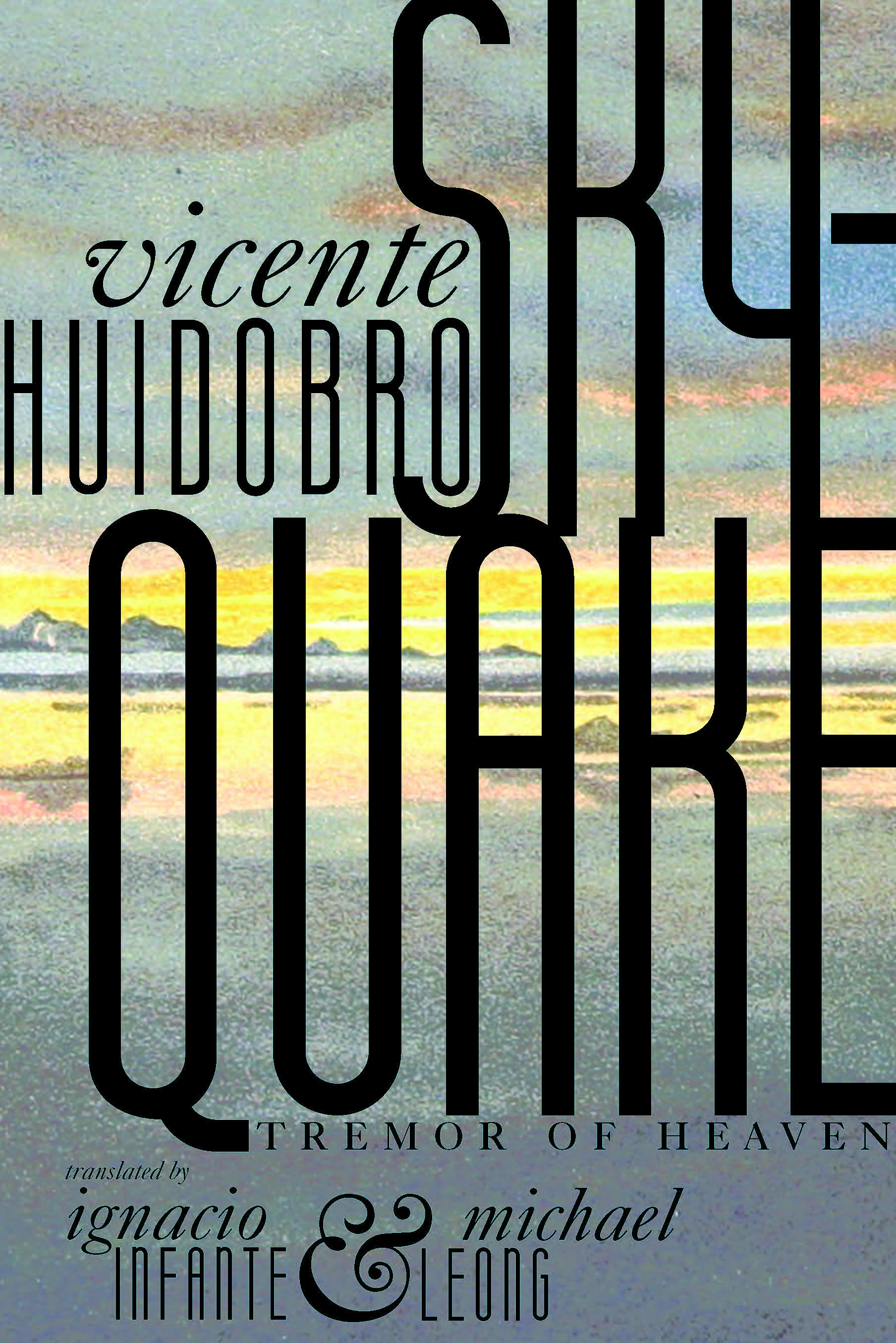
Sky-Quake: Tremor of Heaven by Vicente Huidobro (co•im•press, 2020). Translated by Ignacio Infante & Michael Leong.
[“Mystical, cosmic, exuberant, boisterous, otherworldly, operatic, epic, outlandish. These are just some of the adjectives that apply to this multilingual masterwork of one of the most important poets of the twentieth century. The Gods and wars and ghosts inside Huidobro’s language explode off the page, creating an affective experience that is vertiginous, that makes the body and mind quake along with the sky, the word, the image. Huidobro is a singular writer, a legend of the global avant-garde. This sumptuous new translation is a tremendous service to contemporary poetry and to literary history.”
—Daniel Borzutzky]

Words on Edge (Black Square Editions, 2018)
[“Working out a necessary and constantly evolving counterintuition–uneasy, agitated, restless and ceaselessly inventive–Michael Leong’s Words on Edge clocks the alarm of those who ‘wake late’ in a world of fragments and found materials. Bricoleur of the ‘jagged, ad hoc equation’ that is the contemporary, the poet constellates a spacious, ever-enlarging structure from a heap of broken posterities to make space for ‘the first blossoms of wild meaning.’ The assertions are fresh, tragicomic, and engaging, and the ongoing effort to accurately describe (and affect) a transforming situation is thrilling: this is work that leads us toward ‘a future collapse into / a full state of wakefulness.’ Don’t wait!”
-Laura Mullen]
[“Michael Leong’s poetry is exquisite. We say something is exquisite when it is alluring and elegant, but also when it is razor-fine, when it has an edge, and that edge might be used to slice open a section of air and pull something out of it that hadn’t existed before, something that we did not know existed, something that existed outside of language and was conjured into being by an unorthodox employment of that very same language. This is called invention, and can lead to great and wonderful things, what André Breton would call the marvelous.”
-John Olson]
Who Unfolded My Origami Brain? (Fence Digital, 2017)
Cutting Time with a Knife (Black Square Editions, 2012)
[“Leong’s glowing hieroglyphs show that the poetic Word emerges––as irony from iron––from the whirled atoms of the World itself. Indeed, Leong redefines the space-time of the page as a furnace of pure imagination, where the cadaver of modernist poetics is smelted with black humor…”
-Andrew Joron]
[“…a periodic table of poetic koans rife with miraculous nutation.”
-Will Alexander]
[“smart, witty poems that are deceptively philosophical!”
-Eileen Tabios]
[“Leong goes his own way: Open to trying out all kinds of modes and methods, he is beholden to no one.”
-John Yau]
[“He’s got a wonderful sense of humor, combined with a magician’s ease and the biggest wand in three counties.”
-Kevin Killian]
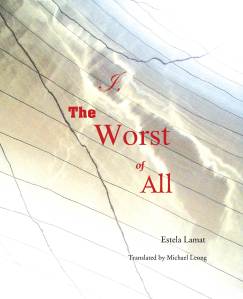
I, the Worst of All (blazeVOX [books], 2009) by Estela Lamat, translated by Michael Leong
[“Leong’s translation of Lamat’s book…should be read.”
-Johannes Göransson, Exoskeleton]
[“Recalling the poetry of Ginsberg, Lamat knows how to set words free.”
–Handbook of Latin American Studies]
Chapbooks:

Teaching the Little Magazine (The Poetry Collection, University at Buffalo, 2019)

Police Lineups (Epigraph, 2018)
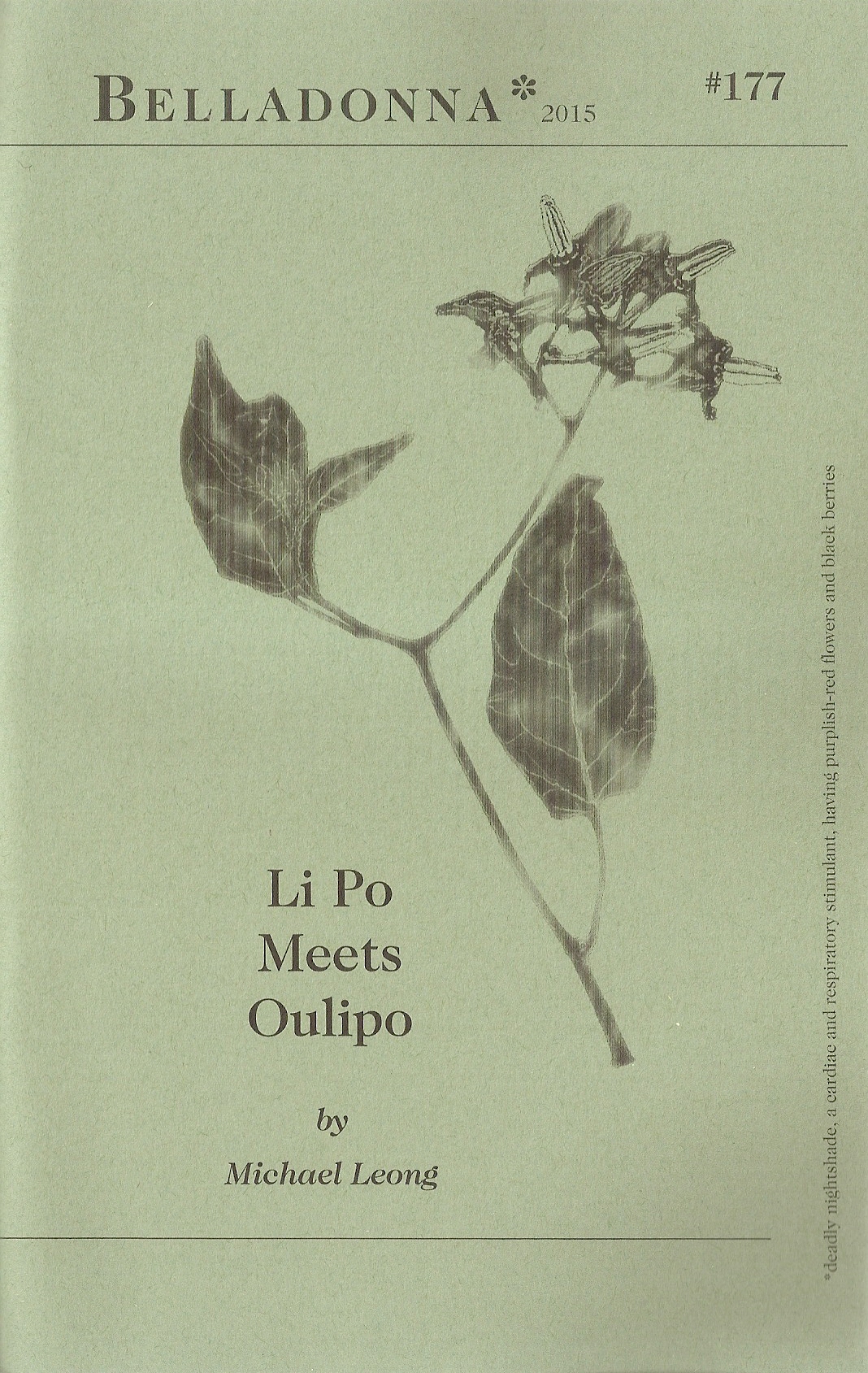
Li Po Meets Oulipo (Belladonna*, 2015)
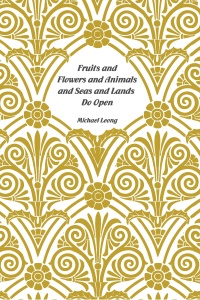
Fruits and Flowers and Animals and Lands and Seas Do Open (Burnside Review Press, 2015)
[Winner of the 2014 Burnside Review Chapbook Contest]
[“Michael Leong’s vocabulary is totally stuffed/ multiplying in mirrors/ scattered over hillsides/ bubbling right over the top, and he’s going to give it all to you—he’s generous. He’s generous and funny and a little troubled—and “a little troubled” is, of course, the most logical and authentic response we could hope for anyone who’s examining life and poetry and personhood and artist-ness. This book is so enjoyable—like I said, giving and funny, but also very unlike anything I’ve read lately. It promptly wins the reader over.” – Hannah Gamble]
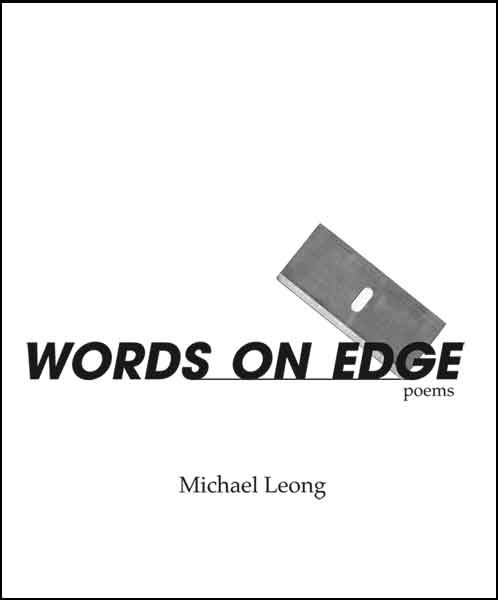
Words on Edge (Plan B Press, 2012)
[Winner of the 2012 Plan B Press Poetry Chapbook Contest]
[“This is work that rubs the found language of the web up against the language of the everyday world. Many of the forms are precise, inventive, and informed.” -Rob Fitterman]

THE PHILOSOPHY OF DECOMPOSITION / RE-COMPOSITION AS EXPLANATION (Delete Press, 2011)
[“A more felicitous and compelling commingling of voices/texts would be hard to imagine. This is mash-up done with a surgeon’s skill.” -Evie Shockley]

The Hoax of Contagion (Naissance, 2010)
[“Michael Leong puts the oooh! into Oulipo in this constraint-based suite of pieces.” -Naissance]
Midnight’s Marsupium (The Knives Forks and Spoons Press, 2010)
[Editor’s Pick of 2010, Stride Magazine]
The Great Archivist’s / Cloudy Quotient: Experiments with N+7 (Beard of Bees Press, 2010)
[“…what particularly satisfies about Leong’s book is that the ‘cover version’ poems he produces, almost without exception, are really kind of beautiful and interesting in their own right, and go way beyond wacky or quirky into something rather pleasing and oddly profound.” -Chris Goode]
Blog Staff:
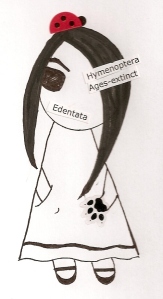
Cacao, philosophical advisor and blog photographer
Recent Posts:
Archive:
- April 2024
- March 2024
- February 2024
- January 2024
- November 2023
- October 2023
- August 2023
- May 2023
- April 2023
- March 2023
- February 2023
- November 2022
- October 2022
- September 2022
- April 2022
- March 2022
- November 2021
- September 2021
- August 2021
- April 2021
- March 2021
- November 2020
- September 2020
- August 2020
- July 2020
- June 2020
- May 2020
- April 2020
- March 2020
- January 2020
- December 2019
- November 2019
- August 2019
- April 2019
- January 2019
- October 2018
- August 2018
- July 2018
- June 2018
- May 2018
- April 2018
- March 2018
- February 2018
- January 2018
- December 2017
- November 2017
- October 2017
- July 2017
- June 2017
- April 2017
- March 2017
- February 2017
- January 2017
- November 2016
- September 2016
- June 2016
- May 2016
- April 2016
- February 2016
- December 2015
- August 2015
- July 2015
- June 2015
- May 2015
- April 2015
- March 2015
- February 2015
- January 2015
- December 2014
- November 2014
- October 2014
- September 2014
- August 2014
- July 2014
- June 2014
- April 2014
- February 2014
- December 2013
- November 2013
- October 2013
- September 2013
- August 2013
- July 2013
- June 2013
- May 2013
- April 2013
- March 2013
- February 2013
- January 2013
- December 2012
- November 2012
- October 2012
- August 2012
- July 2012
- June 2012
- May 2012
- April 2012
- March 2012
- February 2012
- January 2012
- December 2011
- November 2011
- October 2011
- September 2011
- August 2011
- July 2011
- June 2011
- May 2011
- April 2011
- March 2011
- February 2011
- January 2011
- December 2010
- November 2010
- October 2010
- September 2010
- July 2010
- June 2010
- May 2010
- April 2010
- March 2010
- January 2010
- December 2009
- November 2009
- October 2009
- September 2009
- August 2009
- July 2009
- June 2009
- May 2009
Categories:
Friends
- 3by3by3
- A Pelt, a shrub, a soil sample
- Action, Yes
- Apostrophe Books
- Beard of Bees Press
- Behind the Lines
- BIG OTHER
- BlazeVOX
- blazeVOX [blogoscope]
- Buzzer Thirty
- CAVALIER LITERARY COUTURE
- Delete Press
- disdainfulbeauty
- ditch,
- Erika deVries
- Evie Shockley
- Exoskeleton
- experiential-experimental-literature
- Experiments in Text: The Literature that Organisms Demand
- Fact-Simile Editions
- flying object
- Geoffrey Gatza
- Greg Gerke
- GutCult
- HAY(NA)KU POETRY
- International Exchange for Poetic Invention
- j/j hastain
- john madera’s hitherandthithering waters
- Kundiman
- la fovea
- Lana Turner: A Journal of Poetry and Opinion
- Mairéad Byrne
- Mark Yakich
- Mildred's Umbrella
- minutes BOOKS
- Modern Americans
- My Shelf Runneth Over
- Opium Magazine
- Poetry & Popular Culture
- Poets for Living Waters
- Pomo Expo
- PotLatch Poetry
- Rachel Glaser
- RU NaPoWriMo-ing?
- Silenced Press
- Silliman's Blog
- Spend Time With A Power
- Splitleaves Press
- Stephanie Strickland
- THE BLIND CHATELAINE'S KEYS
- The Chapbook Review
- The Cultural Society
- The Home Video Review of Books
- The Introductory Lecture
- The Multifarious Array
- Thompson's Bank of Communicable Desire
- Wheelhouse Magazine & Press


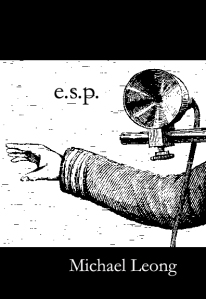


Recent Comments: